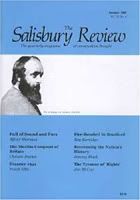Britishness
What are ‘core British values’? Labour hopes to introduce them into the school curriculum, replacing the current ‘citizenship classes’, with classes tracing the origins of values like democracy, freedom of speech, fairness and responsibility. All this, cooked up by higher education minister Bill Rammell, is designed to; "better integrate Muslims into society". And, can be seen as part of the Gordon Brown strategy to include ‘Britishness’ as a central theme of his impending premiership.
Although it’s hard to disagree with the purpose behind this new policy, there are obvious flaws within their thinking. For a start, when I think of myself as British, the best way to describe it would be as a feeling. Even when I knew nothing of Newton, Nelson, Brunel, and Magna Carta, I still felt British. Roger Scruton, writing in today’s Daily Telegraph sums this feeling up:
I cast my mind back to the way in which Britishness was taught to me by family, school, church and town. Those British values were seldom mentioned, and never taught. Britishness was a state of mind, imparted like the sense of family as a collective “we”. It was a matter of belonging, of being at home, of thinking by habit in the first person plural. […] History was our history. It recounted battles that we had fought or lost: it dwelt on our achievements and our shortcomings (though the latter was strictly rationed). […] All our lessons and activities were marked by the same
proprietary feeling: we were being brought up as British, by authority figures infused with a love of the country that we shared.
Scruton then gets a bit sidetracked with a diatribe about “Celtic bias”, but continues into the very core of why this is a doomed proposal:
It (New Labour) is suspicious of national loyalty, and is looking for a set of “values” that will make no reference to a country or the people who inhabit it. […] The proposal to teach “British” values reflects the quandary in which the government now finds itself, seeking to revive our first person plural while rejecting our shared national loyalty.
His conclusion strikes a more optimistic note:
But values are matters of practice, not of theory. They are not so much taught as imparted. You learn them by immersion, by joining in with your contemporaries in team spirit, competition and adventure – in short, by fashioning an “I” out of the collective “we”. That is how, I became both English and British: because I was immersed in them and they were part of me.
Our disaffected young Muslims already have a powerful experience of immersion. The mosque is a value-imparting milieu, in which young people join on equal terms in a shared obedience, overseen by stern authority figures who teach not doubt and discussion, but absolute truth. If those young people are to identify themselves with out country, they must be provided with a first person plural that both includes the mosque and also over-rides it.
I believe it can be done, having met many public-spirited and patriotic British Muslims. Almost invariably, however, they have been products of an English public school – in other words, of the old first person plural that the Labour Party despises.
Scruton has quite succinctly nailed, the true essence of Britishness. However, I can’t agree with his optimistic take on British Muslims. The Muslims who he is likely to have met, public school educated, business owners, are not the ones who are likely to be disaffected. The language of business is universal. A Jew, a Muslim and a White Christian who work within the business world, will have more in common with each other, than with their own communities. The young Muslim from a northern town will, on the other hand, be far more likely to be radical and alienated from British society.
My own belief is that the cause of most of this, is the immigration policies of the last 15 years. The policies, that led to North African and Arab radicals coming to Britain. The policies that have allowed continued mass importation of sub continent, brides and grooms. A moratorium on immigration is a must.
With a halting of mass immigration, the return of Scruton’s collective “we”, and time, we may have a chance of integration. But, as these policies are the antithesis of liberalism, and ergo our 3 major parties, I wouldn’t hold my breath, for a solution.














0 Comments:
Post a Comment
<< Home